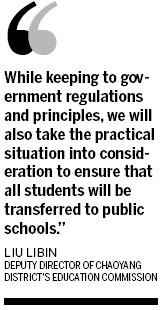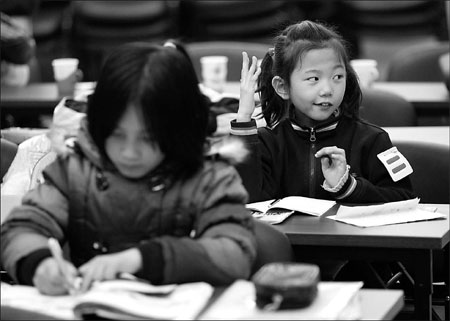Boosting migrants' education
Updated: 2013-01-14 07:54
By Cheng Yingqi (China Daily)
|
||||||||
|
A girl raises her hand to ask for help in an office of the neighborhood committee of the Anhuili Community in Beijing. The neighborhood committee sets aside one of its offices for the children of migrant workers working near the community after school and arranges volunteers to take care of them before their parents bring them home. Xue Jun / for China Daily |

Chaoyang authorities to shut down 18 privately operated schools
The education authority in Beijing's Chaoyang district said it will shut down non-government run schools for migrant workers' children to ensure the students receive a better education.
"The policy will guarantee migrant workers' children will enter public schools," Liu Libin, deputy director of the district's education commission, told China Central Television.
"While keeping to government regulations and principles, we will also take the practical situation into consideration to ensure that all students will be transferred to public schools," he said.
The commission plans to close all 18 schools that cater to migrant workers' children within the next two years, according to China National Radio.
Since 2006, education authorities in the capital have been tightening the management of schools for migrant workers' children by closing those that do not meet the standards set by government.
As greater numbers of migrant workers have moved to large cities since the 1990s, private schools for their children sprung up in Beijing, Shanghai and other large cities because public schools refuse to admit children without a hukou, or residence permit.
However, some of the schools are unsafe or simply not suitable for schooling, and they are unable to obtain the certificates to operate.
Over the past six years the Chaoyang education commission cut the number of schools for migrant workers' children from 135 schools teaching more than 50,000 students, to 25 schools teaching 11,000 students.
Tang Xiongfang, 38, a migrant worker from Hunan province who now works in Beijing, said two of her three children are studying at Tongxin Shiyan, a non-government school in Chaoyang.
Tang said she is sad to hear schools teaching migrant children will close.
"My oldest child is 15 years old and has already graduated from the school, and my other two children are both at that school. The school taught them a lot, and I can see they are very happy studying there."
She said she worries that if her children are made to transfer to public schools, they will have trouble adapting to the new environment.
"After all, the children have been in the school since they were 5," she said.
Enrolling in a public school requires parents to submit a series of certificates, such as a temporary residence permit and a certificate of employment, which can be difficult for migrant workers to acquire.
Tang Siping, principal of the Zhenxing School in Haidian district in Beijing, said the district's education authority is doing all they can to help the migrant workers' children.
"The government authorized two private schools for migrant workers' children, so some children who cannot enroll in public schools, for reasons such as their parents cannot gather all the certification needed, can go to the private schools," Tang said. Zhenxing School is one of the authorized schools. It currently has 1,500 students.
Although the education authority provides some financial support to the authorized schools, Tang said it is not enough.
"The government subsidy only covers the school's facilities, but does not include the expenses of the faculty. And we cannot charge the parents because that would make it unaffordable for them," Tang said.
The school has more than 50 teachers; the wages alone cost 100,000 yuan ($16,090) per month. And the school did not buy social insurance for teachers until this year, after receiving a donation from a foundation.
"The money is enough to pay three years' social insurance for the teachers. But after that, I do not know where else to find that money."
chengyingqi@chinadaily.com.cn
(China Daily 01/14/2013 page4)

 In Photos: 7.0-magnitude quake hits Sichuan
In Photos: 7.0-magnitude quake hits Sichuan
 Li Na on Time cover, makes influential 100 list
Li Na on Time cover, makes influential 100 list
 FBI releases photos of 2 Boston bombings suspects
FBI releases photos of 2 Boston bombings suspects
 World's wackiest hairstyles
World's wackiest hairstyles
 Sandstorms strike Northwest China
Sandstorms strike Northwest China
 Never-seen photos of Madonna on display
Never-seen photos of Madonna on display
 H7N9 outbreak linked to waterfowl migration
H7N9 outbreak linked to waterfowl migration
 Dozens feared dead in Texas plant blast
Dozens feared dead in Texas plant blast
Most Viewed
Editor's Picks

|

|

|

|

|

|
Today's Top News
Live report: 7.0-magnitude quake hits Sichuan, heavy casualties feared
Boston suspect cornered on boat
Cross-talk artist helps to spread the word
'Green' awareness levels drop in Beijing
Palace Museum spruces up
First couple on Time's list of most influential
H7N9 flu transmission studied
Trading channels 'need to broaden'
US Weekly

|

|








